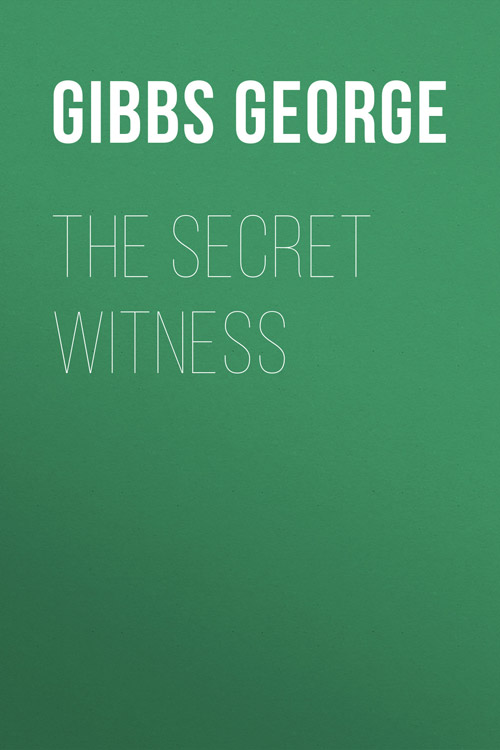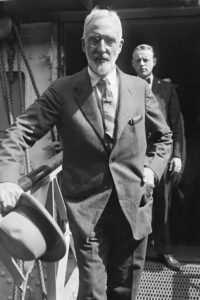
The Secret Witness
“Yes, yes,” she sighed. “And I am happy in it. You know it, nicht wahr?”
Silence, except for the drowsy hum of the bees and the songs of the birds. No fatalism is long proof against the call of love and June. Marishka was content that her flight had ended in capture. She sat dreamily gazing at the white clouds floating overhead while she listened to the voice at her ear, replying to it in monosyllables, the language of surrender and content. The moments passed. Konopisht was no longer a garden. They enchanted their pavilion, and even the red roses forgot.
Suddenly, the girl stood upright and peered wide-eyed through an opening in the foliage.
“What is it, Marishka?”
She put a finger to her lips in token of silence, and Renwick followed her gaze down the gravelled path that led toward the arbour. As under-secretary of the British Embassy in Vienna, he had been trained to guard his emotions against surprises. Still, the sight of the three figures approaching them down the path left him empty for the moment of all initiative. In the centre, the Archduke pulled deliberately at his heavy dark moustaches while he listened to the figure upon his right, a man of medium stature who wore a hunting suit and a jäger hat with a feather in it. He carried his left hand, concealing a defect of his arm, in the pocket of his shooting jacket, while with his free right hand, he swung an ebony cane. His moustaches were turned straight upward from the corners of his mouth, and the aggressive chin shot outward as he glanced right and left, talking meanwhile with his companions. The third figure was very tall, topping even the Archduke, who was by no means small of stature, by at least six inches; his hair, or as much of it as could be seen beneath the soft hat, was grey, and a long beard, almost white in the patches at either side of the chin, descended in two long points half of the way to his waist.
Renwick recognized the visitors immediately and turned toward his startled companion, his mind made up immediately about the propriety of his situation.
“Marishka,” he whispered, “we must go.”
“It is too late,” she murmured. “They would see us.”
Read or download Book
George Gibbs
George Fort Gibbs (March 8, 1870 – October 10, 1942) was an American author, illustrator, artist, and screenwriter. As an author, he wrote more than 50 popular books, primarily adventure stories revolving around espionage in “exotic” locations. Several of his books were made into films. His illustrations appeared prominently in such magazines as The Saturday Evening Post, Ladies Home Journal, Redbook, and The Delineator. He also illustrated some of his novels and the novels of others. As a painter, he produced many portraits and painted murals for Pennsylvania Station and Girard College in Philadelphia. His screenwriting credits include a film about the life of Voltaire.
Biography
George Gibbs was born in 1870 in New Orleans. His father, Benjamin F. Gibbs, was a naval surgeon with the ironclad fleet stationed there. Dr. Gibbs had seen many adventures in his naval career. He had taken part in the Paraguay Expedition aboard the USS Mystic. During the American Civil War, he had taken part in the battle of Mobile Bay aboard the steam sloop USS Ossipee and had been aboard one of the ships that chased the CSS Webb on its dash down the Mississippi.
In mid-war, on February 25, 1864, Dr. Gibbs married Elizabeth Beatrice Kellogg. The bride’s father, Major George Kellogg, was a homeopathic doctor brought to occupied New Orleans by General Nathaniel P. Banks, commander of the Army of the Gulf, and assigned to various duties as army surgeon, and as medical advisor to the family of General Banks. Nine months after their marriage, Mrs. Gibbs gave birth to a daughter, Julie Aline Gibbs. In 1870 a son, George Fort Gibbs, was born.
Dr. Gibbs continued to rise in the navy, ultimately attaining the rank of Medical Inspector and being designated Fleet Surgeon of the European Squadron on August 20, 1881. He took Elizabeth, Aline, and George with him, settling them in Geneva, where George was enrolled as a student at the Chateau de Lancy for two years. Chateau de Lancy also educated such men as William Carlos Williams, Sir Harold Acton, and Hamilton Fish. In September 1882, while aboard the USS Lancaster sailing for Trieste, Dr. Gibbs became seriously ill. According to one source, he was probably suffering from “malarial fever”. When the ship reached port, he was immediately moved to a hospital, where he died on September 9. His son George was twelve years old at the time.
Elizabeth Gibbs was extremely distraught over her husband’s death. The family returned to the United States in November 1883, debarking in New York and then taking a train bound for Washington, D.C., where Elizabeth’s father awaited them. George was then thirteen years old, and Aline eighteen. The children were concerned about their mother, who had expressed thoughts of suicide. As the train approached Union Station (at the site of what is now Penn Station) in Baltimore, Elizabeth left her children and entered the ladies’ restroom. She was gone for a long time, and the children began to worry. When the train arrived at the station they tried the door of the restroom, but it was locked. George climbed up to a transom and looked in, only to find the room empty, and its window open.
The children notified railroad officials, who sent an engine back down the tracks to look for Elizabeth. Aline went ahead to D.C., to meet with her grandfather, and George stayed behind with the searchers. Later that day Aline received a telegram from George, telling her that their mother had been found lying on the tracks a few miles from the station. Her skull was fractured, and she was taken to a hospital, where she died soon after. She had climbed six feet up to the window and leaped from the train, landing on her head.






